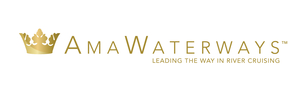Enjoy an authentic European river cruise experience on board AmaPrima. Immerse yourself in the sights, sounds and fresh scents of Europe's great landscapes from our signature twin balconies, available in most staterooms. Revel in the luxury of white marble bathrooms with glass-enclosed, multi-jet showers and granite countertops. Or indulge in the added enhancements of a suite, including a larger sitting area with sofa and two chairs, and an expansive bathroom with a tub and separate shower. Emerge from your refreshing slumber for bountiful buffet breakfasts in the Main Restaurant, fresh salads and sandwiches at lunch, and one entertaining evening diving into a regionally inspired tasting menu at The Chef's Table. Have tea in the Main Lounge, visit the massage and hair salon for a treat, find distinctive souvenirs in the gift shop, take a dip in the heated pool and more—it's all yours to experience on the incredible AmaPrima.
Cruise ID: 53323
Explore Europe's amazing sights like the locals do. We were the first river cruise line to carry an entire fleet of complimentary bicycles on board, so you can experience biking alongside enchanting riverside pathways and in city centers. Whether you feel like joining one of our exclusive guided bike tours, or want to go discover on your own, there are many ways for you to explore on two wheels during your cruise. The beauty of Europe doesn't just lie in its architecture and landmarks – there are also breathtaking sights to be seen when you venture out into nature. That's why we've designed special guided hikes that will take you a bit off the beaten path, offering a unique perspective in beautiful destinations such as Austria's UNESCO-designated Wachau Valley. All of our guided hikes and bike tours are included in the cruise fare so you have more choices when it comes to how you prefer to explore.
Although we leave gratuities to your discretion, many of our guests have asked for general tipping guidelines. Gratuities may be charged on a credit card or given in cash.
7-Night Cruise
Ship's Crew: The entire amount will be divided equally amongst all crew members. Recommendation: 100 Euros per 7-night cruise, per guest. (AmaMagna 120 Euros per 7-night cruise, per guest)
Cruise Manager: Your Cruise Manager is not part of the ship's crew and is the AmaWaterways representative who also accompanies you on any pre- and/or post-cruise hotel/land extensions you may have booked. Recommendation: 25 Euros per 7-night, per guest; 4 Euros for each additional day, per guest for pre- and post-cruise hotel/land extensions.
10-Night Cruise
Ship's Crew: The entire amount will be divided equally amongst all crew members. Recommendation: 143 Euros per 10-night cruise, per guest.
Cruise Manager: Your Cruise Manager is not part of the ship's crew and is the AmaWaterways representative who also accompanies you on any pre- and/or post-cruise hotel/land extensions you may have booked. Recommendation: 36 Euros per 10-night, per guest; 4 Euros for each additional day, per guest for pre- and post-cruise hotel/land extensions.
11-Night Cruise
Ship's Crew: The entire amount will be divided equally amongst all crew members. Recommendation: 158 Euros per 11-night cruise, per guest.
Cruise Manager: Your Cruise Manager is not part of the ship's crew and is the AmaWaterways representative who also accompanies you on any pre- and/or post-cruise hotel/land extensions you may have booked. Recommendation: 40 Euros per 11-night, per guest; 4 Euros for each additional day, per guest for pre- and post-cruise hotel/land extensions.
14-Night Cruise
Ship's Crew: The entire amount will be divided equally amongst all crew members. Recommendation: 200 Euros per 14-night cruise, per guest.
Cruise Manager: Your Cruise Manager is not part of the ship's crew and is the AmaWaterways representative who also accompanies you on any pre- and/or post-cruise hotel/land extensions you may have booked. Recommendation: 50 Euros per 14-night, per guest; 4 Euros for each additional day, per guest for pre- and post-cruise hotel/land extensions.

















